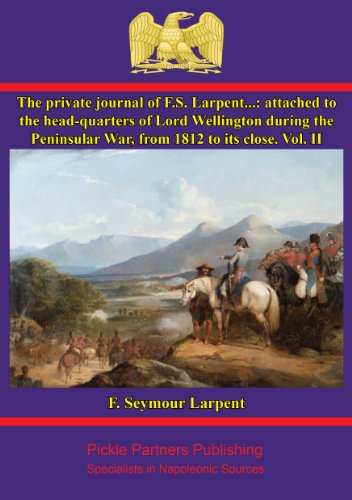
The Private Journal of F.S. Larpent -
by F. Seymour Larpent
"attached to the head-quarters of Lord Wellington during the Peninsular War, from 1812 to its close"
Popularity
0 / 5
* A book's popularity is determined by how it compares to all other books on this website.
Where to buy?
Buy from Amazon* If you buy this book through the link above, we may receive a small commission at no extra cost to you.
The Private Journal of F.S. Larpent - by F. Seymour Larpent
Details
War:
Napoleonic Wars
Perspective:
Commanders
Military Unit:
British Army
True Story:
Yes
Biography:
Yes
Region:
Europe
Page Count:
274
Published Date:
2013
ISBN13:
9781782890225
Description
Brief Summary
The Private Journal of F.S. Larpent offers an intriguing glimpse into the workings of Wellington's headquarters during the Napoleonic Wars. The book, comprised of letters written by F. Seymour Larpent to his stepmother, provides first-hand accounts of his duties and personal experiences as the Judge-Advocate-General. Captured briefly in 1813 and then exchanged, Larpent was responsible for ensuring the proper conduct of courts-martial and maintaining the validity of evidence, a critical role in maintaining military discipline. The journals are not only personal reflections but also vital historical documents that illuminate the inner workings and challenges faced by military personnel during the war.
Main Themes and Topics
The primary themes of The Private Journal of F.S. Larpent include military justice, personal adventure, and the intricacies of war-time bureaucracies. Through Larpent’s detailed observations, readers gain insight into the complexities of military law and the operational difficulties within Wellington's army during a time of tumultuous historical significance. Larpent’s reflections and anecdotes about his interactions with different military and civilian figures provide a rich tapestry of interpersonal dynamics and the impact of warfare on individuals and broader society.
Writing Style and Tone
Larpent's writing style in his journal is descriptive and meticulous, capturing the essence of military life with a balance of personal reflection and professional observation. The letters convey a tone of candid sincerity, providing a direct and unembellished account of the day-to-day challenges and adventures faced during the Peninsular War. His narrative is marked by a clear, structured approach that communicates the gravity of his responsibilities while also offering lighter, humanizing moments that reveal his personal character and resilience.
Awards and Recognition
The letters, published posthumously and edited by Larpent’s half-brother Sir George Larpent, were highly regarded upon release, passing through three editions in the same year of 1853. The work’s significance is underscored by its inclusion in historical analyses, notably cited in works such as "Wellington’s Army." The detailed account provided by Larpent remains a valuable resource for historians and enthusiasts of military history, particularly those interested in the Napoleonic Wars.
Criticism
While The Private Journal of F.S. Larpent is praised for its detailed and authentic account of military proceedings and life, some readers may find the focus on administrative and legal proceedings less engaging compared to other war narratives that highlight battlefield action. The formal tone and detailed recounting of court-martial protocols might not resonate with all audiences, particularly those seeking a more action-centric depiction of the Napoleonic Wars. However, this perspective is integral for comprehending the broader organizational efforts that underpin successful military campaigns.









